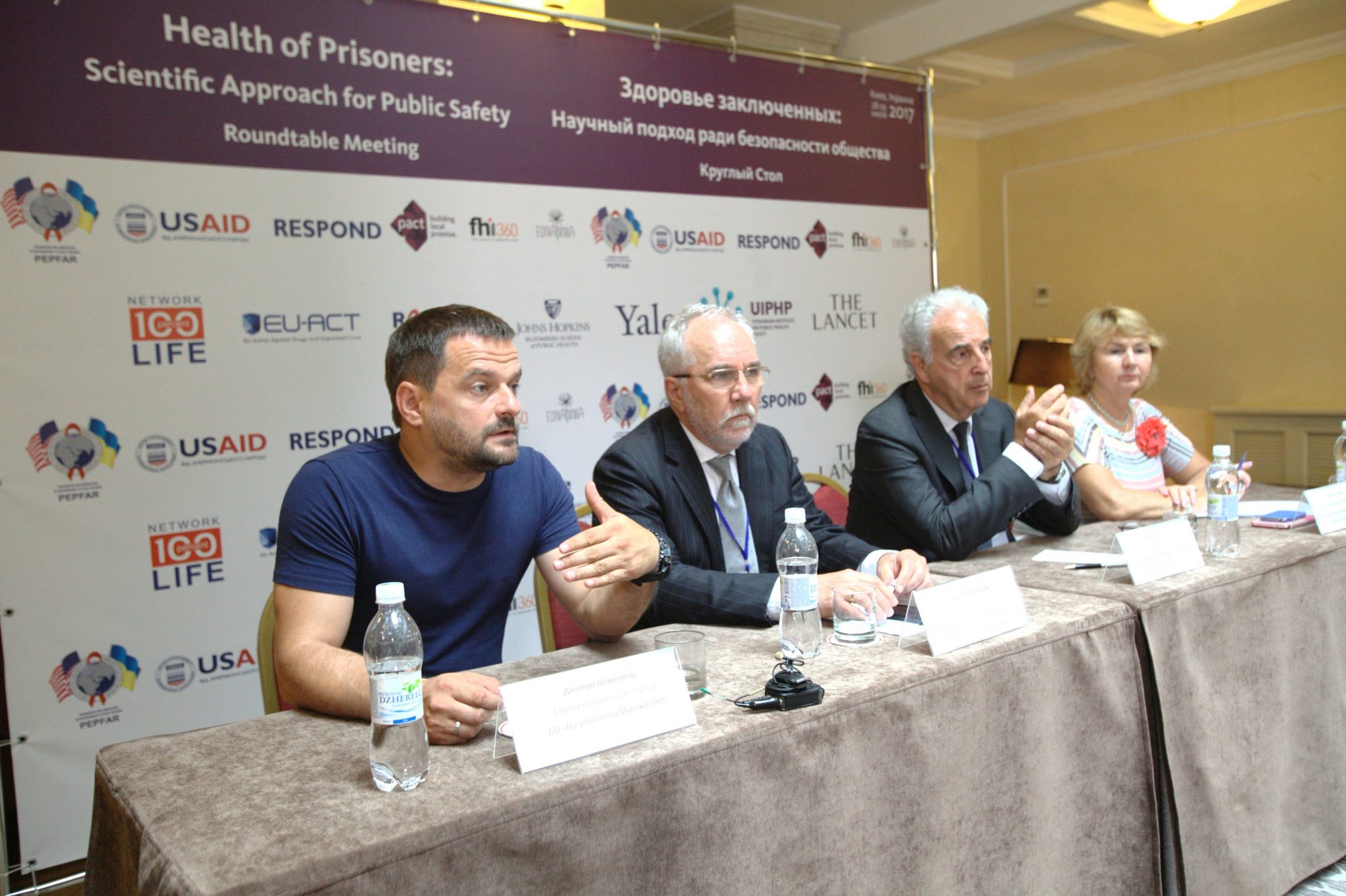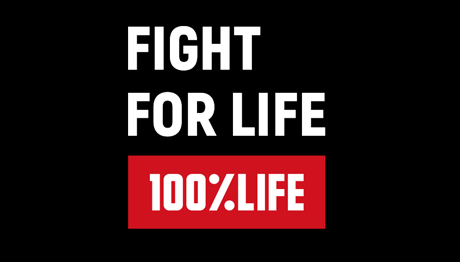Round table “How does the health of prisoners affect the health of all Ukrainians?” Took place in Kyiv.

The participants of the round table “The health of prisoners: how does it affect the health of all Ukrainians?”, organized in Kyiv on July 28-29, 2017, developed recommendations to be provided to the Ukrainian government, ministries and departments in order to improve the health of prisoners and reduce the impact on the health of the general population. The problem of access to medical services for prisoners, as well as reducing the spread of HIV/AIDS, tuberculosis and hepatitis epidemic in the society may be addressed only with the urgent introduction of special programs based on the recommendations of specialists.
Scientists from the Ukrainian Institute on Public Health Policy, John Hopkins Bloomberg School of Public Health, Yale University School of Medicine, with the participation of the UN Secretary General’s Special Envoy for HIV/AIDS in Eastern Europe and Central Asia (EECA), representatives of the Ministry of Justice and Ministry of Health of Ukraine, as well as experts and public activists from the post-Soviet countries gathered to discuss the topic of the health impact of prisoners on the health of Ukrainians and residents of other EECA countries, and to develop an effective strategy to counter the existing problems.
In Ukraine and in the whole EECA region the attention is increasing to the risks, problems and opportunities for improving the health of people who use drugs in various situations: pre-trial detention, holding in custody and release from prison. The Roundtable participants consider extremely important to develop mechanisms that will improve the quality of medical services in prisons, determine the cascade of care, provide training for correctional facility and prison staff. It is very important to provide access to integrated care for the former prisoners (comprehensive treatment involving key specialists), and to improve the prison health system in line with international goals for HIV prevention and treatment.

60 000 of inmates in Ukrainian prisons have limited access to the prevention and treatment of especially dangerous infections. In particular, it concerns such diseases as HIV, tuberculosis and viral hepatitis. According to the research, 60% of prisoners have hepatitis C, 20% have HIV, and 75% of new cases of tuberculosis occur in prisons. It’s the injection drugs use which is responsible for the main way of transmission of the immunodeficiency virus and hepatitis C in prisons. More than half of prisoners use injectable drugs, thus posing a risk of the infection spread (data from The Lancet: “The perfect storm: incarceration and the high-risk environment perpetuating transmission of HIV, hepatitis C virus, and tuberculosis in Eastern Europe and Central Asia“, July 14, 2016).
Prisoners do not have proper access to the high quality diagnosis, while medical care and drug dependence treatment (in particular, opioid agonist therapy − substitution maintenance therapy), needle and syringe exchange programs and the like are also not available for them to the sufficient extent. In addition, according to the forecasts of specialists (also in The Lancet), an increase in the risk of parenteral HIV infection during imprisonment can provoke 55% of new cases among drug users in the next 15 years. And every year 30 000-50 000 people are released from correctional facilities, becoming an important driving factor of HIV/AIDS, tuberculosis and hepatitis epidemic spread in society.
“In 2011, only one in ten prisoners in Ukraine who had HIV knew about their diagnosis. In 40% of cases HIV status is detected while the person is serving the sentence. According to the research, the prevalence of HIV infection in Ukrainian prisons is 22 times higher than among general population. After serving their sentence, former prisoners return to society, which does very little to help them to rehabilitate adequately, to receive the necessary medical services for treatment and prevention. All these factors contribute to the spread of epidemics, to which society is seldom ready”, says Serhiy Dvoryak, MD, honoris causa Chairman of the Board of the Ukrainian Institute of Public Health Policy.
Professor Michel Kazatchkine, the UN Secretary General’s Special Envoy for HIV/AIDS in Eastern Europe and Central Asia, believes that Ukraine should follow the best practices which have already proven their efficiency in some EECA countries: “In Azerbaijan and Kyrgyzstan, a high level of antiretroviral therapy is provided for people living with HIV who get diagnosed in the correctional facilities. In one country in Eastern Europe and Central Asia, there is no data on the coverage of treatment after release. At the same time, even data from countries with high standards of living indicate that former prisoners have difficulties during the transitional period, when they adapt to freedom. ART coverage during this period drastically decreases, so they may again relapse into injecting drugs. Accordingly, the risk of contracting HIV is also increasing (especially for women)”.
He also provided an example from the medical journal Lancet_Altis__2016_en that substitution therapy (with methadone or buprenorphine) is globally recognized as the most effective method of chronic drug dependence treatment, moreover, it has proven to be one of the most efficient strategies for preventing HIV. In addition, mathematical modeling shows that in Eastern Europe and Central Asia substitution therapy, combined with the ART expansion, is an even more effective (albeit more expensive) way of combating HIV.
“We can halve the spread of HIV among the population if we start working with prisoners today, that is, provide them access to diagnostics, antiretroviral therapy and substitution therapy”, says Serhiy Dvoryak, MD, honoris causa Chairman of the Board of the Ukrainian Institute of Public Health Policy. “After all, according to studies published by The Lancet, the incidence and spread of HIV in society can dramatically decrease by 2030″. In particular, the incidence rate may drop by 75%, and prevalence – by 56%. And all this will be achieved if we ensure prolific cooperation of doctors and criminal justice agencies. In addition, more than half of new HIV infections will be prevented, mainly because of reducing the risk associated with the injecting drug use”.
Natalia Nizova, General Director of the State Institution “Center for Public Health of the Ministry of Health of Ukraine” added, “I have a good piece of news. The penitentiary system, as a component of the Ministry of Justice, is open and willing to cooperate on improving the legislative framework related to drug users who got behind the bars. The Ministry of Justice is on the way to reorganizing the system of medical care for prisoners and continues transferring their medical institutions to the subordination of the Ministry of Health. All these steps will allow us to improve the diagnosis and treatment of inmates. This should be one of the priorities for the country which is progressing along the European way of development”.
Now every Ukrainian is exposed to the infection risk, because after release former prisoners become a source of socially dangerous diseases spread. One might get infected with TB in city transport and public places. Unprotected sex and injections pose risks of HIV and hepatitis. Meanwhile, few of the former prisoners are registered with tuberculosis and narcological clinics or AIDS centers to receive treatment, since such registration actually causes them to be discriminated, as they face limited employment opportunities and loss of certain privileges. Only a few can receive substitution therapy, an effective option for drug dependence treatment.
“The conditions in prisons are intolerable. Walls are blotched with fungus and mold, the air is stifling, cells are overcrowded. There are no doctors, medicines, and most importantly, there is no intention to treat prisoners. People with HIV and impaired immune response also catch tuberculosis in prison, and if they use drugs they are exposed to hepatitis. The can only get real treatment upon release, if they make it through this ordeal”, said the Chairman of the Coordination Council of the “All-Ukrainian Network of PLWH” and civic activist Dmytro Sherembey. “This year the Network is launching a pilot project for the treatment of hepatitis C in prisons, but unfortunately, we will be able to cover only institutions in some areas, while treatment is needed nationwide.”


